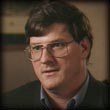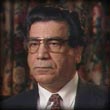

 Well, there's a large number of players involved here [in killing UNSCOM]. You
have Iraq, which was not complying fully with Security Council resolutions.
What I mean by fully is they weren't letting UNSCOM complete that last few
percentage points to get us up to 100 percent. Well, there's a large number of players involved here [in killing UNSCOM]. You
have Iraq, which was not complying fully with Security Council resolutions.
What I mean by fully is they weren't letting UNSCOM complete that last few
percentage points to get us up to 100 percent.
So, Iraq is complicit. But that'd been happening for eight years. UNSCOM was
alive and well and breathing for seven years. So, you can't say that Iraq
killed UNSCOM because Iraq behaved the same way throughout, and UNSCOM still
existed.
The Security Council created UNSCOM under Chapter 7 of the United Nations
Charter, and that carries with it a promise to enforce its own law, and the
Security Council wasn't enforcing its law, and that helped to perpetuate this
cycle of cheat-and-retreat confrontation, and then, backing down.
You could say the Security Council killed UNSCOM, but again, that's a process
that's been taking place for years, and UNSCOM was still alive, well,
breathing, kicking, doing its job.
Now we come down to the final two players. You have an executive chairman who,
for whatever reasons, has become enamored with the support of the United
States. You have a United States administration, the Clinton Administration,
which, as we've seen with Madeleine Albright's unfortunate statements of 1997,
have decided to pervert international law and say that it doesn't matter what
Iraq does with disarmament, we're going to keep economic sanctions in place.
Now, these sanctions are becoming harder and harder to defend, on two fronts.
One, what good are they doing? Are they having an impact on the target, Saddam
Hussein? The answer is no. Who suffers under sanctions? Innocent Iraqi
people. Thousands of children under the age of five die every month because of
these sanctions, and while the American public might be oblivious to this,
believe me, the rest of the world is not, and the longer we continue this
program of economic sanctions targeted against Iraq, the more isolated the
United States becomes.
But Richard Butler had come to a decision that we couldn't carry out certain
activities without the support of the United States. That the United States
was somehow our No. 1 backer in the Security Council, and he allowed the United
States to start calling the shots. An inspection a little too confrontational,
Richard? Why don't we pull the plug on it, buddy, and stop it.

I think quite clearly Iraq killed UNSCOM. UNSCOM had to do what it did in the
ways that it did it, and ultimately led to the current crisis, because Iraq
didn't comply. So fundamentally, the responsibility is Iraq.
When it ultimately came down to it, the second responsibility is the
splintering of the Security Council coalition. Once the Council coalition
started to fray in 1994, everything that UNSCOM had done became extremely
hazardous.
And Ambassador Ekeus has my ultimate respect as a diplomat because he held
together UNSCOM on a steady course in the face of a coalition that had fallen
apart. Richard Butler [his successor] bore, unfortunately, the responsibility
of coming in and trying to do that as the coalition became even more
splintered.
So, first it's Iraq. Secondly, it's the failure of the coalition. And
ultimately, it was doomed at that point. I never believed from the beginning
we would keep an UNSCOM type of aggressive inspection together for eight years,
nor did I believe that we would keep sanctions on of the type that we have in
Iraq, for eight years.

I think the Clinton Administration has made it far, far worse than it ever
needed to be. In part, they simply didn't invest in the maintenance of
international opposition to Saddam. It's not enough to pick up the phone when
Saddam does something and the crisis is at hand. You've got to invest in these
relationships so if and when Saddam does something, people are prepared to push
back. The Clinton Administration tended not to do that.
They've also either been unwilling to use force in a serious way.-- It's been
often feckless. At times they've threatened to use force, then haven't
followed through. So we've had the worst of all worlds -- a lot of pin pricks.
But every time you use military force, you draw down on your political capital.
You draw down on the resolve of this international consensus to confront
Saddam. But we weren't getting enough for it.
So it seems to me the Administration has often gotten it exactly wrong. They
did some things -- enough to anger or at least alienate a lot of the
international community -- but not really enough to either help UNSCOM or to
really change what Saddam could and could not do. So I think we've paid a
price for our policy.

 [With UNSCOM] you begin to get a picture of just how convoluted, how Byzantine,
the politics and operations of this world's first experiment in multi-national
intelligence could be. [With UNSCOM] you begin to get a picture of just how convoluted, how Byzantine,
the politics and operations of this world's first experiment in multi-national
intelligence could be.
You are necessarily drawing on the most closely guarded techniques and
capabilities of member states. You are bringing a coalition together that has
quite different ideas about what UNSCOM should be doing, and suspicions of each
other, and secondary agendas which could be served by this interesting device
of an agency which gathers all of this kind of information. And it just became
a mess.
Ultimately, I think that's what destroyed UNSCOM. UNSCOM as presently
constituted, is never going back into Iraq. I think that the era of intrusive,
on-demand inspections in Iraq is probably over, as well.
It may be that UNSCOM simply had an impossible mission from the beginning. The
French have been saying for awhile -- and I think the American government has
come around to this view -- that the only way to disarm a country against its
will is to occupy it. We did it after the Second World War with Germany and
Japan. Came in, wrote a new constitution for Japan. Expunged everyone that
the U.S. wanted to expunge from the Japanese power structure. And started
over.
George Bush made a conscious decision not to do that in Iraq. Norm Schwarzkopf
had contingency plans for pressing on to Baghdad, toppling the government, and
installing a new government. George Bush said, "That's not what we're going to
do." They then passed a resolution backed by these overwhelming military
forces that said, "You, Iraq, are going to disarm from these special weapons or
else." They did not put the ground forces in place to compel that behavior.
They thought they could do it with threats and with an oil embargo, and they
couldn't.
But what killed UNSCOM is that these rivalries and these overlapping and
competing agendas ultimately ate away at it from within.
There is a school of thought out there now that is blaming Butler for UNSCOM's
decline. I'm not sure I agree. Fundamentally, he was dealing with a different
hand. The biggest thing that changed was that sanctions fatigue and different
national agendas set in and UNSCOM support on the Security Council, which was
always uneven, declined.
At the very moment that UNSCOM felt the need to use ever more intrusive and
controversial methods to find Iraq's weapons, the Security Council was more and
more uncomfortable with what UNSCOM was doing. And nobody could have played
that hand successfully, in my opinion.
By the end there simply was not the international consensus to do what UNSCOM
needed to do to find Iraq's weapons. You had this delicate balance all
throughout the last several years, in which the United States and UNSCOM and
Britain were desperately trying to hold onto the hammer of military threats to
secure Iraqi compliance, and throughout that period they are watching the
Security Council support erode.

 In a sense, Ritter, by doing this, almost destroyed now UNSCOM.... These
revelations, which he had to share, the international inspection system itself
now is in danger, because not many states would be forthcoming in allowing such
an inspection system anymore, without calculating the possibility of ... having
spies from the big power in charge of the teams. In a sense, Ritter, by doing this, almost destroyed now UNSCOM.... These
revelations, which he had to share, the international inspection system itself
now is in danger, because not many states would be forthcoming in allowing such
an inspection system anymore, without calculating the possibility of ... having
spies from the big power in charge of the teams.
But UNSCOM, in a sense, had no recourse. I mean, Saddam used his own special
security organization to be in charge of the weapons systems -- their safety,
their transport, their whatever. So, saving the weapons was given to SSO, the
Special Security Organization.
Now, if you spy on the SSO, to try to find where the weapons is, you get some
extra information. And this is what happened in many cases. Gradually, you
have to get in deeper and deeper into the layers of the Iraqi government, and
closer and closer to Saddam, to know what's going on. Because only the people
around him know what's going on. So, they have to go to those people.
Now, in getting so deep, you will find many of Iraq's secrets. Now, Iraq is an
enemy to the US now. ... And the people who work in these groups have
nationalities ... so they would, we'd expect, and they would use spies.-- And
that's been classic. I mean, even in old organizations that happened --
infiltration, information that leaks to various states, and information
reported directly to the other states. We had that in IAEA. We had two
informers in the IAEA, who will report to Iraq directly.
You had Iraqi informers inside the international--
Inspectors, yes, inspectors. They were to report to us directly. ... And they
told us many of the inside secrets of the IAEA.
So, that's used. I mean, why everybody is surprised about it, I don't know.
But the end result of it, it will undermine the international inspection
system, so I don't know what's the point of it right now?
One imagines, if you had informers inside the IAEA, that Iraq was trying to
do the same thing with UNSCOM?
... Oh, yes, Kamel employed one of the guys as a secretary to one of the
groups, and when he was being debriefed [by UNSCOM after he defected from
Iraq], that guy was present there, so Kamel threw him out. He told him, "I
employed you, why are you here? You were reporting to me."
... There's nothing new. Everybody uses it. So, the hue and the cry is, I
don't know what it's about. Everybody uses this. I'm not trying to say it's
alright. It did undermine the international inspections. But why does it have
to come now? And why is it made such a big deal right now, with all these
revelations? ... Anyway, it ended up almost, now, destroying UNSCOM and putting
all the inspection under suspicion and Iraq would be now in a better position
to probably dictate who is going to come, on a nationality basis.

home +
experts' analyses +
photos +
interviews +
what it took +
join the discussion
readings & links +
chronology +
synopsis +
tapes & transcripts
frontline +
pbs online +
wgbh
web site copyright WGBH educational foundation
 |